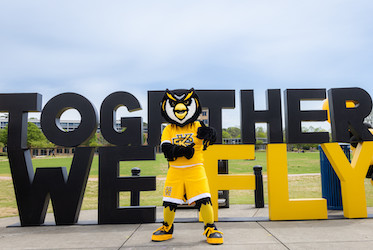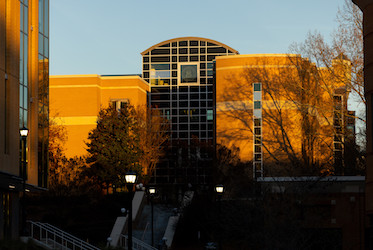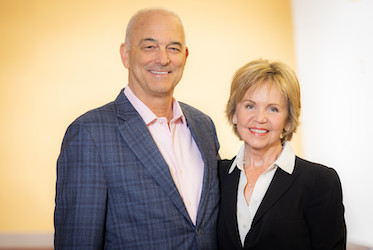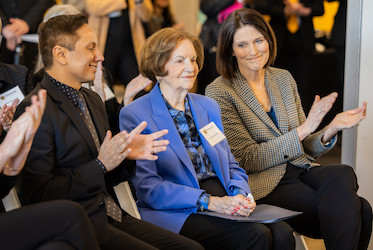
Fostering Change
KENNESAW, Ga. | Jul 12, 2018
Alumna, student use firsthand experience to help teens in foster care
Kemara Johnson and Melody McLaurin share a common bond: they have each called Kennesaw State home after living in foster care as a teen.
Their firsthand experience in foster care – and choosing to immediately attend college – have given each of these women a rare perspective, and it has also fueled their desire to help others who face similar circumstances.
McLaurin, a junior studying journalism, is volunteering as a counselor during College Bound Camp, July 9-13. The camp, sponsored by KSU’s Campus Awareness Resource and Empowerment Services and funded by The nsoro Foundation, brings 25 high school students in foster care to campus for a weeklong residential experience.
Now in its third year at KSU, the camp introduces young students to college life and explores issues such as financial literacy, health and wellness, self-advocacy and STEM activities.

McLaurin relates to the campers, after having spent nearly 18 months in foster care as a teen. Her mother had passed away when she was young, and her dad, who was raising her, was sent to prison. She never attended a summer camp when she was a child or teen, and wishes she had a similar opportunity.
“I think this is a great opportunity and gives them a chance to have fun on campus, and not think about where their next meal is coming from or how their foster parent treats them,” McLaurin said. “They get to be kind of normal.”
Like McLaurin, Johnson was first placed in foster care at the age of 16, and she didn’t speak to anyone in her new group home for some time.
“I think about when I first entered the group home and how lost I was,” said the Kennesaw State alumna. “I had to learn to trust again.”
The now 24-year old Johnson, who earned her bachelor’s degree in psychology from Kennesaw State in May, has come a long way since that agonizing turn of events six years ago.
“I know how these students are feeling and thinking. I wanted to volunteer for the mentorship,” she said. “I want to talk to them about life and their aspirations.”
Every Saturday, Johnson spends her day with at-risk teens and young adults as part of the Orange Duffle Bag Initiative, an Atlanta-based nonprofit that provides life coaching for at-risk youth. She serves as a life coach, advocate and mentor to provide support.
“Teens in foster care are often deemed as bad or unruly, when in fact all they want is love and attention,” she said. “They are frequently misunderstood.”
She knows what it is like to be in these teens’ shoes.
Johnson endured physical abuse her entire life – believing it was the norm – until a high school teacher noticed her scars and sought help. Johnson was placed in foster care in a group home setting and lived there for two years.
In Georgia, nearly 14,400 children are in foster care, and only about 3 percent graduate from college, according to The nsoro Foundation.

Johnson is among that small percentage of college graduates, and McLaurin is only a few semesters away from that goal, but both women say their success was in part due to seeking help from KSU’s CARE Services, a support unit for students who have experienced homelessness, food insecurity and/or the foster care system.
When Johnson first arrived at Kennesaw State in 2014 after transferring from Dalton State, KSU’s on-campus housing was full and she had nowhere to turn. Her mentor while in foster care suggested that she reach out to CARE Services.
“When Kemara started at KSU, she had many dreams but needed support and guidance,” said Marcy Stidum, director of CARE Services. “Now the independent lady she has blossomed into has made me so very proud of her. She has not always made it easy to help her. It took a while.”
Johnson lived in a hotel for a month but still had no car, no driver’s license and no job. A room on campus became available a few weeks into the semester and Johnson came off the waitlist and has lived on campus since.
“The biggest thing I’ve learned while in college is how to ask for help,” she said. “Since there were a lot of trust issues for me, I’ve learned I can say ‘I need help’ without someone wanting something back.”
McLaurin echoed that concern.
“When I came to college, I was overwhelmed,” added McLaurin, who is sharing many things she’s learned about going to college with the high school students at the camp. “With the resources and helpful tips from the counselors and admissions and recruitment specialists, the campers can feel more at ease about signing up for college.”
For these women, their experiences in foster care may have given them a rare perspective, but by volunteering and mentoring younger students, they are giving back to the foster care community in extraordinary ways.
– Tiffany Capuano
Photos by David Caselli
Related Stories
A leader in innovative teaching and learning, Kennesaw State University offers undergraduate, graduate and doctoral degrees to its more than 45,000 students. Kennesaw State is a member of the University System of Georgia with 11 academic colleges. The university’s vibrant campus culture, diverse population, strong global ties and entrepreneurial spirit draw students from throughout the country and the world. Kennesaw State is a Carnegie-designated doctoral research institution (R2), placing it among an elite group of only 7 percent of U.S. colleges and universities with an R1 or R2 status. For more information, visit kennesaw.edu.


















